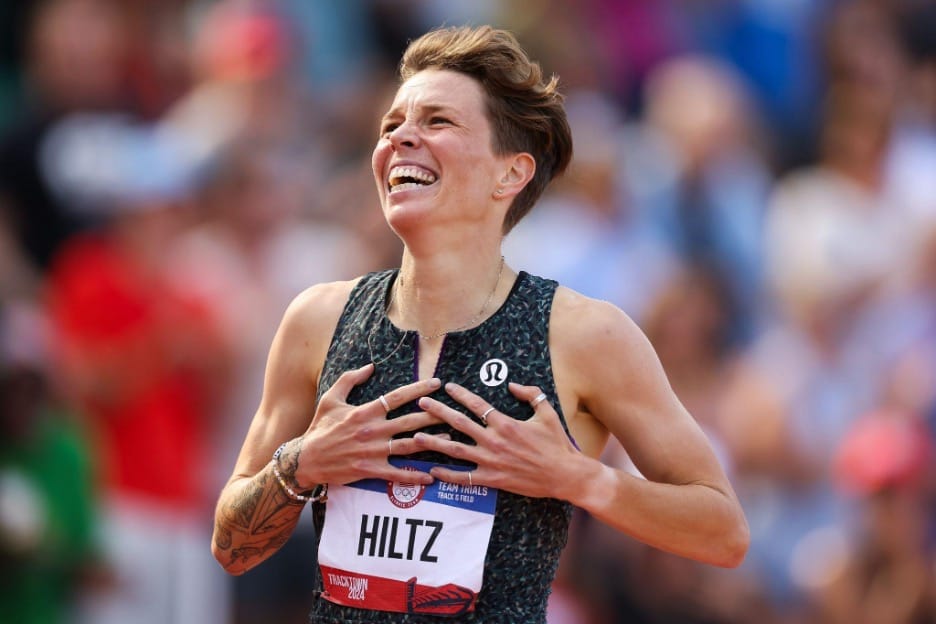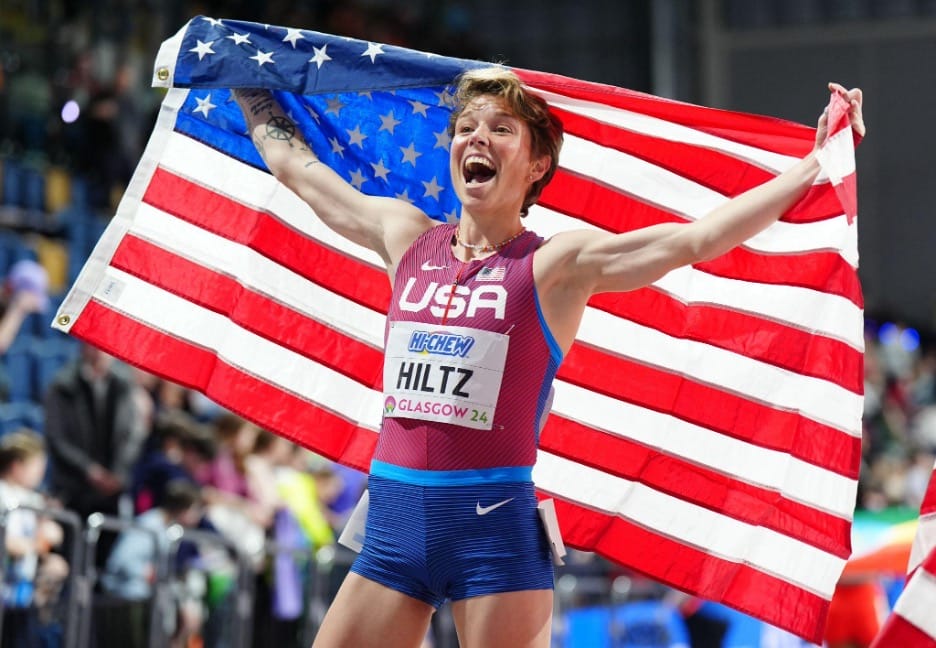Contact: press@glaad.org
Join GLAAD and take action for acceptance.
Trending
- Meredith Marks Hosts a Special Evening with GLAAD Ahead of the 40th Anniversary
- GLAAD Centers Black Queer Voices at United States Conference on HIV & AIDS
- From “Hacks” to “The Traitors,” LGBTQ Stars Shine at the 2025 Emmy Awards
- Fact Sheet: Debunking “Trans Terrorism” and Other False Claims in High-Profile Crimes
- Don’t miss “The Groomsmen: Second Chances” coming to your TV this Saturday!
- GLAAD Gaming Spotlight: Outerloop Games’ Chandana Ekanayake on Crafting Queer, Brown, and Bold Stories
- Healing Through Music: David Hernandez Releases “feel it all”
- The Okra Project Expands Nationwide with BetterHelp to Deliver Free Mental Health Care for Black Trans Communities
FACT SHEET: MIDDLE DISTANCE RUNNER NIKKI HILTZ AND PARTICIPATION OF TRANSGENDER, NONBINARY ATHLETES IN THE 2024 PARIS OLYMPICS

Nikki Hiltz (they/them) is representing Team USA at the Paris Olympics. Hiltz is 29 years old, from Aptos, California, a two-time runner-up in the women’s NCAA 1,500m championships and recorded the second-fastest time by any American in the Olympic trials in June.
Hiltz came out as transgender and nonbinary in 2021, and has been outspoken about World Athletics’ anti-transgender guidelines that have limited their ability to access health care that affirms their gender identity.

Reporters covering the Olympics and transgender and nonbinary Olympians are encouraged to include the following facts and context when reporting on Hiltz’s story and participation.
- Hiltz followed all protocols and guidelines to participate, noting: “Going to the Olympics is such a dream of mine, but it’s also such a dream of mine to take testosterone or grow facial hair or have top surgery, and so I think sometimes I can really resent this sport.”
- Transgender and intersex athletes have been a part of the global sports since at least the 1930s.
- The NCAA has welcomed transgender participation in sports since at least 2010.
- The International Olympic Committee (IOC) announced last month that for the first time in history, the Paris Games will feature full gender parity on the Olympic fields of play. Transgender inclusion has had no negative effect on participation and parity at the Olympics, or any other level of participation. This fact mirrors research on transgender participation showing states with inclusive policies have more girls and women participating in sports than states with bans.
- Reporters must note the (IOC) released guidelines more than two years ago to support transgender participation, written in consult with medical, athletic and human rights professionals, stating there should be “NO PRESUMED ADVANTAGE BASED ON SEX ASSIGNED AT BIRTH OR SEX CHARACTERISTICS.”
- IOC recommendations additionally include guiding principles for all sport federations to follow, encouraging:
- Inclusion of athletes of all gender identities;
- Use of an evidence-based approach in constructing rules;
- Preventing athletes from undergoing unnecessary procedures or treatments to be eligible.
- Nikki Hiltz is not a transgender woman, however, comparisons to other transgender athletes must include the facts: there is no evidence that transgender athletes are negatively impacting sports and other athletes, and no evidence that transgender women are dominating women’s sports. Swimmer Lia Thomas, the best-known and most defamed transgender collegiate athlete in history, followed all protocol to participate in a year that also saw cisgender swimmers break four world records and finish ahead of Thomas in the races she participated in. Olympian Erica Sullivan came in 2nd after Lia Thomas at the NCAA Championships 500-meter free and wrote that she’s proud to support Lia and all trans athletes.
- While a select few trans women and girls have been highlighted in the media, no trans woman has ever won an Olympic medal. In fact, since the first trans inclusion policy was introduced by the IOC in 2004, there have been over 50,000 athletes who have competed in the Olympics. In Tokyo 2020, we saw the first out trans woman – Laurel Hubbard, a weightlifter from New Zealand – compete, and she failed to advance past opening rounds. Laurel represents one athlete out of 50,000 in almost 20 years of trans inclusion, or .002% of all Olympians.
- Quinn became the first out nonbinary and transgender athlete to medal at the Olympics as part of Canada’s women’s soccer team.
- Appeals courts reviewing state bans on transgender participation have noted “the absence of any empirical evidence” that opportunities for women athletes are “threatened by transgender women athletes” and in fact found “compelling evidence that equality in sports is not jeopardized.”
- At least 151 out LGBTQ athletes from around the world are competing at the Paris Games.
- The IOC released a media guide that includes guidance on reporting on transgender and nonbinary athletes. The Olympic Broadcast Services has also committed to covering all athletes and gender identities accurately, fairly and inclusively, and has committed to parity in its broadcast production. For Paris 2024, this includes hiring approximately 35 female commentators and ensuring balanced gender representation among senior staff and venue production teams.
For more information on covering LGBTQ+ athletes at the Paris Games, please see the 2024 Paris LGBTQ Olympic and Paralympic Guide by GLAAD, Athlete Ally and Pride House Paris.
About GLAAD:
GLAAD rewrites the script for LGBTQ acceptance. As a dynamic media force, GLAAD tackles tough issues to shape the narrative and provoke dialogue that leads to cultural change. GLAAD protects all that has been accomplished and creates a world where everyone can live the life they love. For more information, please visit www.glaad.org or connect @GLAAD on social media.
Add A Comment
Related posts
Share this
Join GLAAD and take action for acceptance.
ALERT Desk Incident Reporting
Our Picks
Topics
Don't Miss
If you were to ask Ken Schneck about the one thing he is certain of,…












